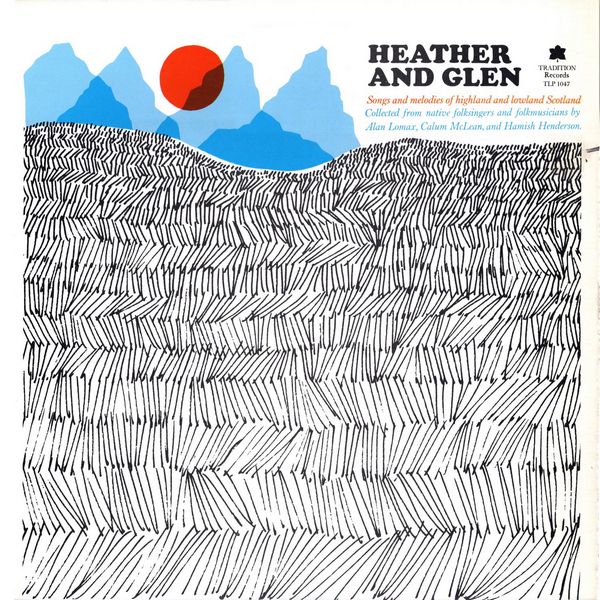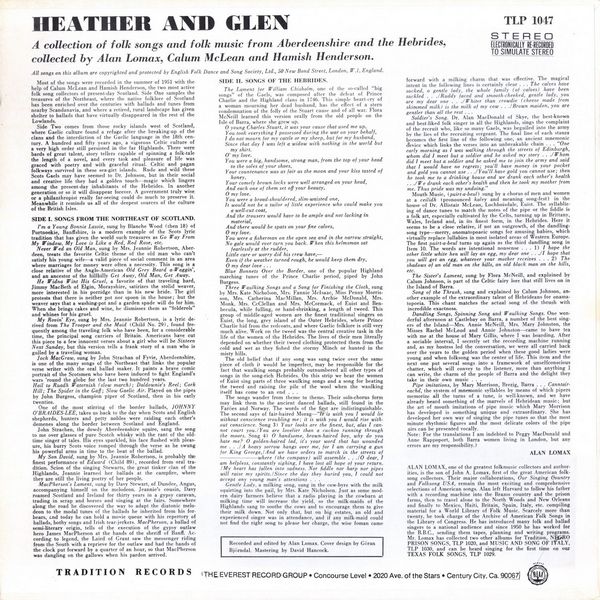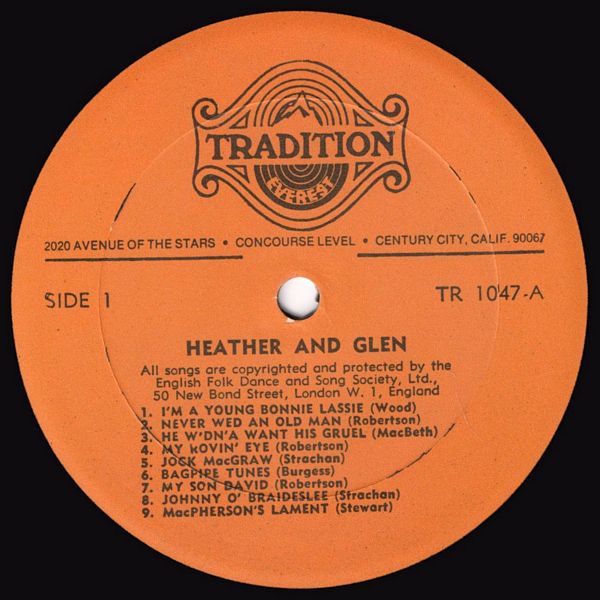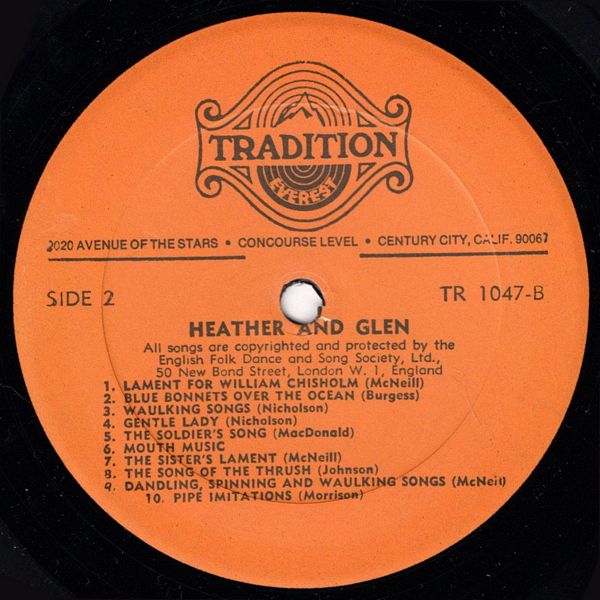

 |



|
Sleeve Notes
Most of the songs were recorded in the summer of 1951 with the help of Calum McLean and Hamish Henderson, the two most active folk song collectors of present-day Scotland. Side One samples the treasures of the Northeast, where the native folklore of Scotland has been enriched over the centuries with ballads and tunes from nearby Scandanavia, and where a retired, rural landscape has given shelter to ballads that have virtually disappeared in the rest of the Lowlands.
Side Two comes from those rocky islands west of Scotland, where Gaelic culture found a refuge after the breaking-up of the clans and the interdiction of the Gaelic language in the 18th century. A hundred and fifty years ago, a vigorous Celtic culture of a very high order still persisted in the far Highlands. There were bards of great talent, story tellers capable of spinning a folk-tale the length of a novel, and every task and pleasure of life was graced with poetry and with graceful ritual. Celtic and pagan folkways survived in these sea-girt islands. Rude and wild these Scots Gaels may have seemed to Dr. Johnson, but in their social and creative life they had a golden touch — magic which lingers among the present-day inhabitants of the Hebrides. In another generation or so it will disappear forever. A government truly wise or a philanthropist really far-seeing could do much to preserve it. Meanwhile it reminds us all of the deepest sources of the culture of the British Isles.
SIDE I. SONGS FROM THE NORTHEAST OF SCOTLAND.
I'm a Young Bonnie Lassie, sung by Blanche Wood (then 18) of Portnookie, Banffshire, is a modern example of the Scots lyric tradition that has given the world such treasures as Go Way From My Window, My Love is Like a Red, Red Rose, etc.
Never Wed an Old Man, sung by Mrs. Jeannie Robertson, Aberdeen, treats the favorite Celtic theme of the old man who can't satisfy his young wife — a valid piece of social comment in an area where marriages for money were often a necessity. This song is a close relative of the Anglo-American Old Grey Beard a-Waggin', and an ancestor of the hillbilly Get Away, Old Man, Get Away.
He Widna Wint His Gruel, a favorite of that traveling bard, Jimmy MacBeth of Elgin, Morayshire, satirizes the stolid weaver, more interested in his porridge than in his new bride. The girl protests that there is neither pot nor spoon in the house; but the weaver says that a washing-pot and a garden spade will do for him. When she brings cakes and wine, he dismisses them as "folderols" and whines for his gruel.
My Rovin' Eye, sung by Mrs. Jeannie Robertson, is a lyric derived from The Trooper and 'the Maid (Child No. 29), found frequently among the traveling folk who have been, for a considerable time, the principal song carriers of Britain. Americans have cut this piece to a few innocent verses about a girl who will be Sixteen Next Sunday, but this version tells a frank story of a man who is gulled by a traveling woman.
Jock MacGraw, sung by John Strachan of Fyvie, Aberdeenshire, is one of the many songs of the Northeast that links the popular verse writer with the oral ballad maker. It paints a brave comic portrait of the Scotsmen who have been induced to fight England's wars 'round the globe for the last two hundred years. Hail to Ruadh Waternish (slow march); Daldownie's Reel; Cork Hill; The Spider in the Gaff; Slow Gaelic Air. Played on the pipes by John Burgess, champion piper of Scotland, then in his early twenties.
One of the most stirring of the border ballads, JOHNNY O'BRAIDES-LEE, takes us back to the day when Scots and English shepherds, hunters and petty nobles were raiding each other's demenes along the border between Scotland and England.
John Strachen, the dowdy Aberdeenshire squire, sang the song to me over glasses of pure Scotch whisky with the rant of the old-time singer of tales. His eyes sparkled, his face flushed with pleasure, his burry Scots voice romped through the verse as he swung his powerful arms in time to the beat of the ballad.
My Son David, sung by Mrs. Jeannie Robertson, is probably the finest performance of Edward (Child 89), recorded from oral tradition. Scion of the singing Stewarts, the great tinker clan of the Highlands, Jeannie learned her ballads at the campfire, where they are still the living poetry of her people.
MacPherson's Lament, sung by Davy Stewart, of Dundee, Angus, accompanying himself on the melodeon. Jeannie's cousin, Davy roamed Scotland and Ireland for thirty years in a gypsy caravan, trading in scrap and horses and singing at the fairs. Somewhere along the road he discovered the way to adapt the diatonic melodeon to the modal tunes of the ballads he inherited from his forbears, and today he can hold a movie queue with his repertory of ballads, bothy songs and Irish tear-jerkers. MacPherson, a ballad of semi-literary origin, tells of the execution of the gypsy outlaw hero James MacPherson at the hands of the sheriff of Banff. According to legend, the Laird of Grant saw the messenger riding from the South with a reprieve for the outlaw and had the hands of the clock put forward by a quarter of an hour, so that MacPherson was dangling on the gallows when his pardon arrived.
SIDE II. SONGS OF THE HEBRIDES.
The Lament for William Chisholm, one of the so-called "big songs" of the Gaels, was composed after the defeat of Prince Charlie and the Highland clans in 1746. This simple heart-cry a woman mourning her dead husband, has the effect of a stem condemnation of the folly of the Stuart cause and of all war. I McNeill learned this version orally from the old people on Isle of Barra, where she grew up.
O young Charles Stuart, it was your cause that used me up,
You took everything I possessed during the war on your behalf,
I do not mourn for my cattle or my sheep, but tor my husband,
Since that day I was left a widow with nothing in the world but my shirt.
O' my love.
You were a big, handsome, strong man, from the top of your head oto the soles of your shoes,
Your countenance was as fair as the moon and your kiss tasted of honey,
Your comely brown locks were well arranged on your head,
And each one of them set off your beauty,
O my love.
You were a broad-shouldered, slim-waisted one,
It would not be a tailor of little experience who could make you a well-cut coat,
And the trousers would have to be ample and not lacking in material,
And 'there would be spats on your fine calves,
0 my love.
You were a fisherman on the open sea and in the narrow straight,
No gale would ever turn you back. When this helmsman sat fearlessly at the rudder,
Little care or worry did his crew have, —
Even if the weather turned rough, he would keep them dry,
0 my dear love …
Blue Bonnets Over the Border, one of the popular Highland marching tunes of the Prince Charlie period, piped by John Burgess.
Three Waulking Songs and a Song for Finishing the Cloth, sung by Mrs. Kate Nicholson, Mrs. Fannie Mclsaac, Miss Penny Morrisson, Mrs. Catherina MacMillan, Mrs. Archie McDonald, Mrs. Monk, Mrs. CcClellan and Mrs. McCormack, of Euist and Benbecula, while fulling, or hand-shrinking, a length of tweed. This group of middle-aged women are the finest traditional singers on Euist, the long, grey island of the Outer Hebrides, where Prince Charlie hid from the redcoats, and where Gaelic folklore is still very much alive. Work on the tweed was the central creative task in the life of the women of the Hebrides. The lives of their men literally depended on whether their tweed clothing protected them from the cold and wet as they fished the stormy Minch or hunted in the misty hills.
The old belief that if any song was sung twice over the same piece of cloth it would be imperfect, may be responsible for the fact that waulking songs probably outnumbered all other types of songs in the song-rich Hebrides. On this strip we hear the women of Euist sing parts of three waulking songs and a song for beating the tweed and raising the pile of the wool when the waulking itself has come to an end …
The songs wander from theme to theme. Their solo-chorus form may link them to the ancient danced ballads, still found in the Faröes and Norway. The words of the first are indistinguishable. The second says of fair-haired Morag — "It is with you I would lit without conscience troubling me; it is with you I would rise without conscience. Song 3) Your looks are the finest, but, alas I cannot court you./You are lovelier than a cuckoo running through the moors. Song 4) O handsome, brown-haired boy, why do you hate me? O golden-haired lad, it's your word that has wounded me … /A heavy sorrow hangs over me, for I am carrying a gun for King George,/And we have orders to march in the streets of_______________where (the company) will assemble … 10 dear, I am helpless, constantly sighing, I have lost all hope of your return. I My heart has fallen into sadness. Nor fiddle nor harp nor pipes will raise my spirits./Since the day they buried you, I could not accept any young man's attentions …
Gentle Lady, a milking song, sung in the cow-byre with the milk squirting into the pail, by Mrs. Kate Nicholson. Just as some modern dairy farmers believe that a radio playing in the cowbarn at milking time will increase the yield, so the milk-maids of the Highlands sang to soothe the cows and to encourage them to give their milk down. Not only that, but on big estates, an old and experienced singer was in attendance, and if any milk-maid could not find the right song to please her charge, the wise foman came forward with a milking charm that was effective. The magical intent in the following lines is certainly clear … The calves have sucked, o gentle lady, the whole family (of calves) have been suckled … /Ruddy faced and smooth-cheeked, gentle lady, you are my dear one … J Whiter than crowdie (cheese made from skimmed milk) is 'the milk of my cow … /Brown maiden, you are gentler than all the rest …
Soldier's Song. Dr. Alan MacDonald of Skye, the best-known and best-liked folk singer in all the Highlands, sings the complaint of the recruit who, like so many Gaels, was beguiled into the army by the lies of the recruiting sergeant. The final line of each stanza becomes the first line of the following one, an ancient mnemonic device which links the verses into an unbreakable chain … "One early morning as I was walking through the streets of Edinburgh, whom did I meet but a soldier and he asked my story … /Whom did I meet but a soldier and he asked me to join the army and said that I would have no regrets; you'll have money in your pocket and gold you cannot use … /You'll have gold you cannot use; then he took me to a drinking house and we drank each other's health … /We drank each other s health and then he took my mother from me. Thus pride was my undoing."
Mouth Music, (puirt-a-beul) sung by a chorus of men and women at a ceilidh (pronounced kaley and meaning song-fest) in the house of Dr. Allistair McLean, Lochboisdale, Euist. The syllablizing of dance tunes to match the notes of the pipe or the fiddle is a folk art, especially cultivated by the Celts, turning up in Brittany, Wales, Ireland and, in its finest form, in the Hebrides. Here it seems to be a close relative, if not an outgrowth, of the dandling-song type — merry, onomatopoaeic songs for amusing babies, which virtually replace lullabies in most isolated areas of Western Europe. The first puirt-a-beul turns up again as the third dandling song in Item 10. The words are intentional nonsense ... 1) / hope the other little white hen will lay an egg, my dear one … Jl hope that you will get an egg, whatever your mother receives ... 2) The shadows of an old man on the hills, an old black man on the hills, etc.
The Sister's Lament, sung by Flora McNeill, and explained by Calum Johnson, is part of the Celtic fairy lore that still lives on in the Island of Barra.
Song of the Thrush, sung and explained by Calum Johnson, another example of the extraordinary talent of Hebrideans for onamatopoeia. This chant matches the actual song of the thrush with incredible exactness.
Dandling Songs, Spinning Song and Waulking Songs. One wonderful afternoon at Castlebay on Barra, a number of the best singers of the Island — Mrs. Annie McNeill, Mrs. Mary Johnston, the Misses Rachel McLoud and Annie Johnston — came to have tea with me at the house of Mary Gillis, where I was boarding. After a sociable interval, I secretly set the recording machine running and, as my hostess led the conversation, we were all carried back over the years to the golden period when these good ladies were young and when folksong was the center of life. This item and the next one put several songs into a framework of unselfconscious chatter, which will convey to the listener, more than anything I can write, the charm of the people of Barra and the delight they take in their own music …
Pipe imitations, by Mary Morrison, Brezig, Barra … Canntaireachd, the system of mnemonic syllables by means of which pipers memorize all the turns of a tune, is well-known, and we have already heard something of the marvels of Hebridean music; but the art of mouth imitations of pipe music which Mary Morrison has developed is something unique and extraordinary. She has developed her own way of singing the pipe tunes so that the most minute rhythmic figures and the most delicate colors of the pipe airs can be presented vocally.
Note: For the translations I am indebted to Peggy MacDonald and Anne Rappoport, both Barra women living in London, but any errors are my responsibility.)
ALAN LOMAX
ALAN LOMAX, one of the greatest folkmusic collectors and authorities, is the son of John A. Lomax, first of the great American folksong collectors. Their major collaborations, Our Singing Country and Folksong USA, remain the most exciting and comprehensive selections of American songs. Alan left Harvard to follow his father with a recording machine into the Brazos country and the prison farms, then to travel alone to the North Woods and New Orleans and finally to Mexico, Haiti, Britain, Spain, Italy, etc. material for a World Library of Folk Music. Scarcely twenty, he took charge of the Archive of American Folk Song in the Library of Congress. He has introduced many folk and ballad singers to a national audience and since 1950 he has wmked far the B.B.C., sending them tapes, planning and writing pro grim* Mr. Lomax has collected two other albums for Tradition. NEGRO PRISON SONGS, TLP 1020, and MUSIC AND SONG OF ITALY. TLP 1030. and can be heard singing for the first time on our TEXAS FOLK SONGS, TLP 1029.